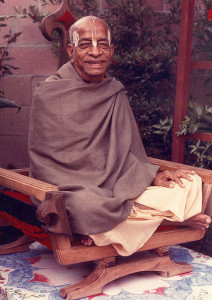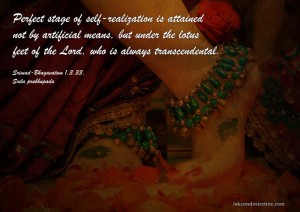Hare Krishna.
14th May, 2015. Gurgaon.
A very Krishna conscious ekadasi to everyone!
Yesterday I read a wonderful verse and its purport where Srila Prabhupada explains what is the real meaning of the word sadhu. I am copying the same for the pleasure of all the devotees.
Should a person seeking a spiritual path practice only detachment ? If No, then whom should one be attached to ?
prasaṅgam ajaraṁ pāśam ātmanaḥ kavayo viduḥ
sa eva sādhuṣu kṛto mokṣa-dvāram apāvṛtam
Translation
Every learned man knows very well that attachment for the material is the greatest entanglement of the spirit soul. But that same attachment, when applied to the self-realized devotees, opens the door of liberation. (SB 3.25.20)
Srila Prabhupada writes in his purport that
Here it is clearly stated that attachment for one thing is the cause of bondage in conditioned life, and the same attachment, when applied to something else, opens the door of liberation. Attachment cannot be killed; it has simply to be transferred. Attachment for material things is called material consciousness, and attachment for Kṛṣṇa or His devotee is called Kṛṣṇa consciousness. Consciousness, therefore, is the platform of attachment. It is clearly stated here that when we simply purify the consciousness from material consciousness to Kṛṣṇa consciousness, we attain liberation. Despite the statement that one should give up attachment, desirelessness is not possible for a living entity. A living entity, by constitution, has the propensity to be attached to something. We see that if someone has no object of attachment, if he has no children, then he transfers his attachment to cats and dogs. This indicates that the propensity for attachment cannot be stopped; it must be utilized for the best purpose. Our attachment for material things perpetuates our conditional state, but the same attachment, when transferred to the Supreme Personality of Godhead or His devotee, is the source of liberation.
What is the benefit of having attachment to a Sadhu ?
Ans : Prabhupada says that it leads one to the royal road of liberation as the sadhu will teach us how to become a devotee, a worshiper and a sincere servitor of the Lord.
Silra Prabhupada explains it in the same purport that
Mahātmā is a synonym of sādhu. It is said that service to a mahātmā, or elevated devotee of the Lord, is dvāram āhur vimukteḥ, the royal road of liberation. Mahat-sevāṁ dvāram āhur vimuktes tamo-dvāraṁ yoṣitāṁ saṅgi-saṅgam (Bhāg. 5.5.2). Rendering service to the materialists has the opposite effect. If anyone offers service to a gross materialist, or a person engaged only in sense enjoyment, then by association with such a person the door to hell is opened. The same principle is confirmed here. Attachment to a devotee is attachment to the service of the Lord because if one associates with a sādhu, the result will be that the sādhu will teach him how to become a devotee, a worshiper and a sincere servitor of the Lord. These are the gifts of a sādhu.
And who is a sadhu ?
Srila Prabhupada explains in his purport:
A sādhu is not just an ordinary man with a saffron robe or long beard. A sādhu is described in Bhagavad-gītā as one who unflinchingly engages in devotional service. Even though one is found not to be following the strict rules and regulations of devotional service, if one simply has unflinching faith in Kṛṣṇa, the Supreme Person, he is understood to be a sādhu. Sādhur eva sa mantavyaḥ [Bg. 9.30]. A sādhu is a strict follower of devotional service.
Should one seek material benedictions from such a sadhu ?
One should not. Srila Prabhupada adds :
These are the gifts of a sādhu. If we want to associate with a sādhu, we cannot expect him to give us instructions on how to improve our material condition, but he will give us instructions on how to cut the knot of the contamination of material attraction and how to elevate ourselves in devotional service.
Isn’t is amazing that how in just one purport, and in such simple language, Prabhupada explains us about a Sadhu, what are benefits of associating with him and what should we seek from him.
All glories to nectarean purports of Srila Prabhupada.
All glories to Sri Guru and Gauranga.
All glories to Srila Prabhupada.


